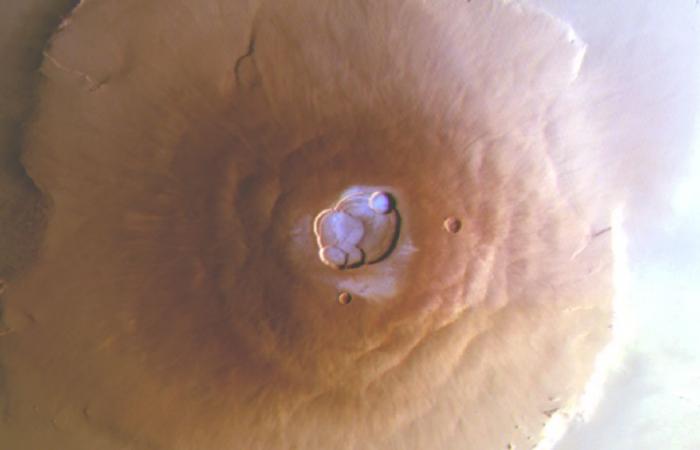Frost accumulates on the highest Martian peaks… near the equator, the sunniest area on Mars. A surprise for researchers.
Frost on Olympus Mons
The presence of frost on the Red Planet has been known for around fifty years, thanks to data collected by NASA’s Viking 2 lander. But until now, the frost discovered was confined to particularly shady regions. Today, researchers report that observations from the European probes ExoMars Trace Gas Orbiter and MarsExpress point to the existence of frost at the top of volcanoes located on the Tharsis dome on which Olympus Mons, the highest volcano in the solar system, sits.
Advertising, your content continues below
An unexpected presence
The ice discovered would only be a tenth of a millimeter thick. But given that it covers many peaks, all the frost at the equator would still be equivalent to 150,000 tonnes of water. Before this observation, researchers thought it was impossible for frost to form around the equator of Mars due to the sunshine and the thin atmosphere, 200 times weaker than on Earth. The combination of these two factors prevents the temperature from dropping too sharply, which is generally approximately the same between the plains and the peaks.
This water ice is not present throughout the day: it melts when the Sun shines too much, and reforms at night to disappear again when daybreak. For the moment, we do not know whether this frost is present throughout a Martian year, as observations could only be made at the end of winter.
The quest for life on Mars
In the meantime, this discovery of the formation of frost at the high altitudes of the equator of Mars is a boon for scientists, because it should allow them to better understand the patterns of the water cycle on the red planet. Additionally, the ability for water ice to form when conditions initially appear unsuitable improves our understanding of the Martian environment.
Above all, the discovery of a new source of water on Mars, a solvent necessary for the emergence of life as we know it, offers a new opportunity to search for extraterrestrial life in the solar system.






